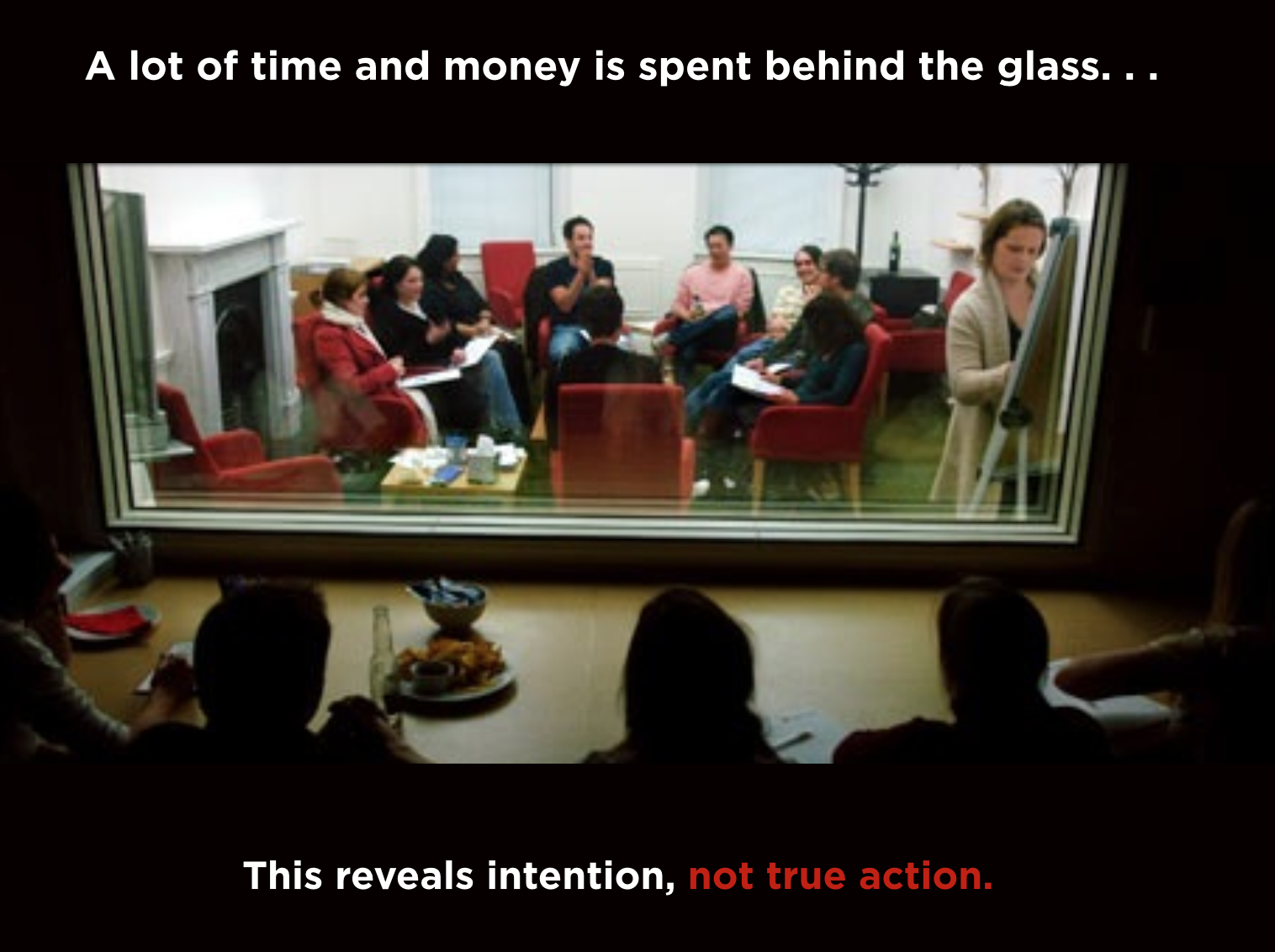
Research: You’re doing it all wrong.
Big Squirrel recently spoke at a DesignSpeaks event in Portland, Oregon on the topic of research and developing brand strategy. Our focus? YOU ARE DOING IT ALL WRONG. Research is an interesting topic to explore. It is a lucrative industry that has yet to evolve much since the 80s. Focus groups and quantitative surveys still dominate the pack, but are these the most effective ways to really get closer to people and learn about what influences how they think, feel and act? To be impactful, research needs to be creative, interesting and engaging for everyone involved. Gone are the days of sitting behind the glass eating M&Ms while a moderator asks participants to rate the likelihood of purchasing one toothpaste over another. Research should provide insights into how people really live and make decisions.
So where do we start?
We have to understand that everything is different now and how people live is fundamentally changing, including the ways we define ourselves, our relationships, how we’re influenced and who is influencing us, and the various media we use to express ourselves. Not only is the way we live different, our expectations for what we want from brands has changed as well. Hope is no longer enough to sustain us. Every consumer now has a voice and believes it should be heard. Using that voice and sharing is the new social currency, which means it is now more important than ever before for brands to listen to and respond to consumers.
What does this mean for research and insight development?
A lot of time and money is spent behind the glass of focus groups. This reveals intention, Not true action. Intention gives us an unrealistic perspective whereas action shows us real human behaviors. As researchers, the best way to get past intention to understand real human behaviors and what drives action is to change what we do and how we do it.

Regardless of how big or small a brand is, there are some universal ideologies behind what it takes to conduct great research and get to the heart of what motivates and influences how people think, feel and act is universal.
THESE ARE OUR 7 GOLDEN RULES OF RESEARCH:
 Rule #1
Rule #1
Who a person is today is often very different from who they want to be.
Everyone has dreams and aspirations. Research should provide a perspective on who a person is right now versus who they want to be, identifying opportunities for how a brand might help them bridge this gap.
Rule #2
People are stupid. But they are still people, not data points.
Demographic profiles don’t tell you what is important to know about someone. Research needs to help identify segments that are based on actions and behaviors, attitudes and beliefs, not age, gender or product usage.
Rule #3
If you have an agenda to prove, you will prove it.
Research isn’t about soothing egos, proving a point or killing creative. Research is about learning. So, ask yourself: are you willing to be wrong about everything you think you know about a consumer, a brand and the category? If you aren’t, then you have an agenda to provide and you shouldn’t do research.
Rule #4
Live with people, in their environment, in the moment.
There’s no replacing actually talking to people and the best environment to do this is on their own turf. If you want to learn about how people really use a product or feel about a brand, you have to be with them in the moment of consumption.
Rule #5
What you see is as important as what you hear.
People will always tell you they don’t watch TV or they aren’t influenced by advertising. But, this doesn’t mean it is true. Research should be done with someone in their environment so you may observe their behaviors and see for yourself what is really influencing their decision making.
Rule #6
What people say and what they mean are not the same thing.
You have to remember it is not always easy to articulate thoughts and especially feelings. You may have to ask the same question in different ways or come up with games that help people to connect the dots so they can successfully articulate their real emotions.
Rule #7
Seek the universal truth(s).
Too often, research is designed to look for differences as opposed to understanding what truly unites an audience. The big insights that are universally shared by an audience are the things that will allow you to create a brand that has genuine impact.
Research should provide insights into how people act and what influences how they think and feel.
When you conduct research that is designed to get at what people love, what they hate, what makes them tick and what excites them, you will be able to identify real insights and craft a brand strategy that is emotionally charged and relevant, allowing you to connect with your audience in the way you intend.
It’s time to stop wasting money and energy conducting research that doesn’t yield real results.
________________________________________________________
Got a nut to crack? We’d love to help you!
Please feel free to reach out to us with any thoughts, comments, or questions.
